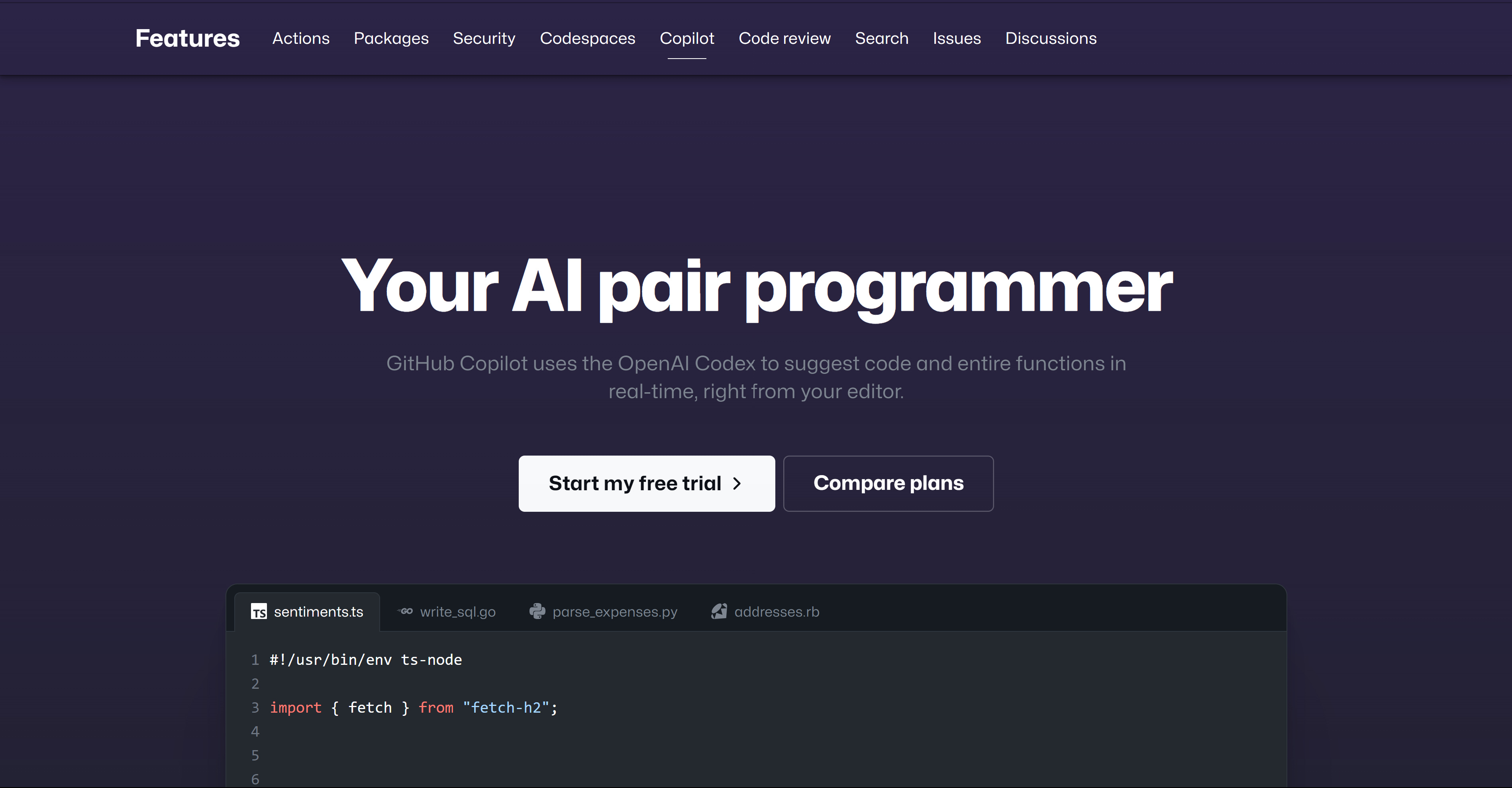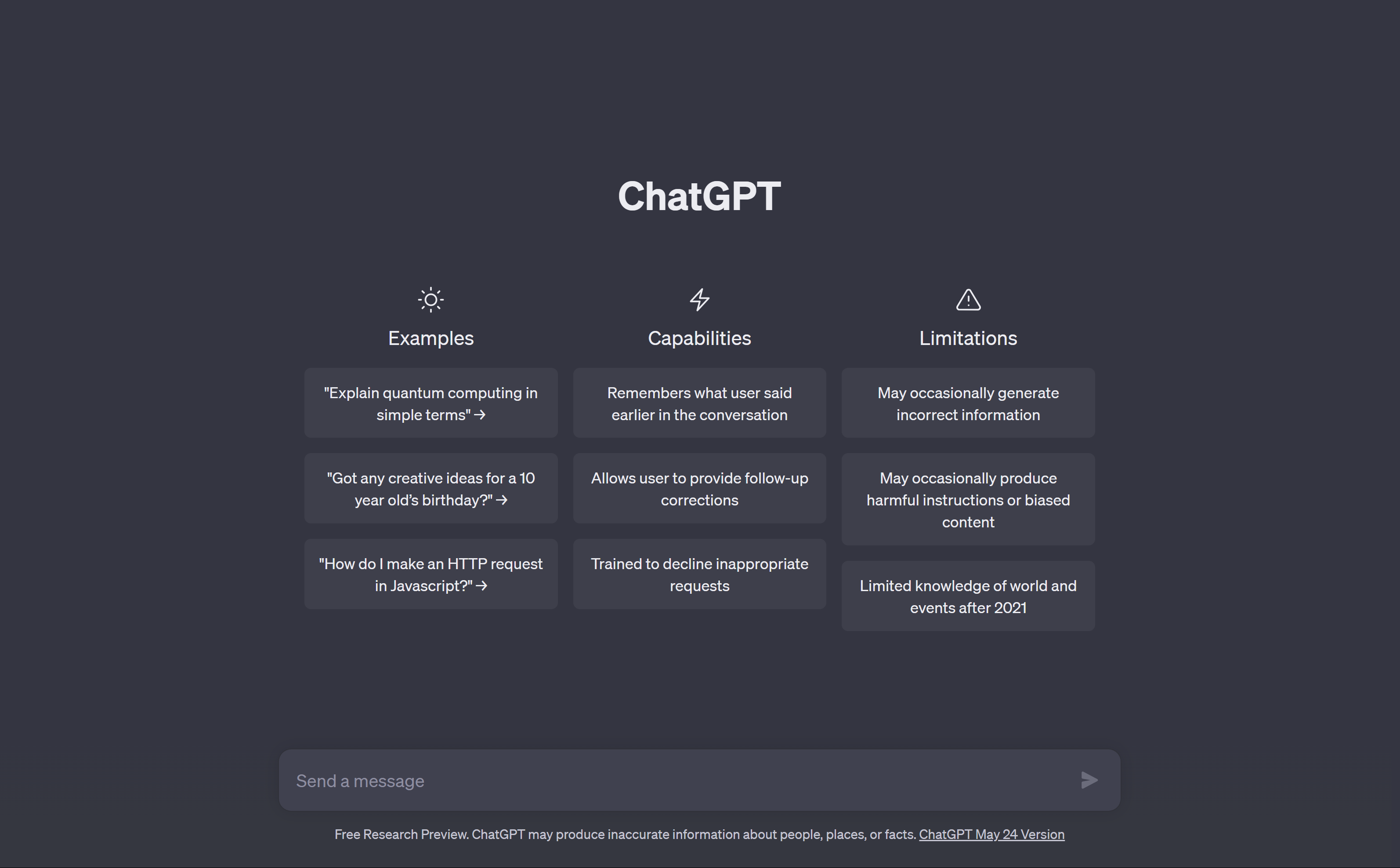Artificial intelligence has revolutionized the way we create and innovate. Regarding programming, AI-driven code completion tools have become an indispensable asset to developers around the globe.
Imagine writing code faster and more accurately with the assistance of powerful AI tools that generate suggestions based on the context of your work.
In this blog post, we will delve into the world of two such tools, GitHub Copilot and ChatGPT, comparing their strengths, limitations, and applications and exploring the exciting possibilities they hold for the future of programming.
While both GitHub Copilot and ChatGPT harness the power of AI, they serve different purposes in the realms of code generation and assistance.
As we journey through this post, we will uncover the unique capabilities of each tool in the GitHub Copilot vs. ChatGPT comparison, evaluate their performance in real-world scenarios, and ponder the ethical considerations and prospects of generative AI tools in the software development landscape.
Short Summary
- GitHub Copilot and ChatGPT are generative AI tools offering distinct code completion capabilities, text generation, and task assistance.
- GitHub Copilot is tailored to generate code snippets, while ChatGPT specializes in natural language processing tasks such as chatbot development.
- Automation, collaboration with human developers, and ethical considerations are essential when utilizing these AI tools for sustainable development.
Understanding GitHub Copilot

GitHub Copilot, an AI-powered code completion tool, accelerates the development process by integrating seamlessly with Visual Studio Code and offering real-time code suggestions.
It supports various programming languages and harnesses advanced machine learning techniques, such as neural networks and natural language processing, to generate code suggestions based on vast datasets.
GitHub Copilot is designed to make coding faster and easier, allowing developers to focus on their work.
Integration with Visual Studio Code
GitHub Copilot is designed to work hand in hand with the Microsoft Visual Studio Code Editor, one of the most popular integrated development environments among developers. By installing GitHub Copilot as an extension in Visual Studio Code, developers can enjoy a smooth and effortless experience with this powerful AI tool.
As a versatile assistant, GitHub Copilot can generate autocomplete-style recommendations for the code, helping developers produce executable code more efficiently.
By providing context-aware advice through code initiation or plain-language comments, GitHub Copilot streamlines the code-writing process and enables developers to focus on the more complex aspects of their projects.
Supported Programming Languages
One of the key strengths of GitHub Copilot lies in its compatibility with various programming languages and frameworks. From C#, C++, Python, Java, PHP, JavaScript, Ruby, and Go, GitHub Copilot is trained in all languages available in public repositories, ensuring that developers working with different technologies can benefit from its intelligent code suggestions.
GitHub Copilot is designed to help developers with writing code, enabling them to write better code faster by providing intelligent assistance.
Machine Learning Techniques
GitHub Copilot leverages state-of-the-art machine learning techniques like deep learning and natural language processing to provide intelligent code suggestions and snippets. At its core, it utilizes OpenAI’s Codex, a neural network trained on a massive dataset of code, enabling it to generate code for various programming languages.
In addition to deep learning, GitHub Copilot employs natural language processing to understand user input and provide relevant code suggestions. It is a powerful tool for developers seeking to optimize their workflow.
Unveiling ChatGPT

ChatGPT is a general-purpose conversational AI platform. It uses natural language processing to generate responses to user input. This is in contrast to GitHub Copilot.
With a range of applications beyond coding, ChatGPT excels in carrying out entire functions like automating customer service interactions and providing virtual assistance for various tasks, such as scheduling appointments, answering questions, and providing product recommendations.
Text-based content, like articles, stories, and summaries, can be generated using this technology. Furthermore, it has a range of applications in a variety of areas.
Applications of ChatGPT
ChatGPT is a versatile AI tool for chatbot development, translation, summarization, and even code generation tasks. This wide range of applications allows ChatGPT to cater to diverse needs across different industries.
For instance, ChatGPT can help software developers comprehend and code based on task descriptions, enhancing their productivity.
In software testing, ChatGPT also shines by generating entire functions and unit tests to validate outcomes, facilitating test-driven development practices. This multifaceted tool can be valuable to organizations looking to streamline their operations and improve efficiency.
Natural Language Processing Capabilities
ChatGPT, a general-purpose language model, excels in natural language processing, enabling it to generate human-like responses to text prompts. This makes it a powerful tool for various applications.
It uses typical NLP techniques such as tokenization, sentiment analysis, named entity recognition, and part-of-speech tagging to interpret and generate text based on user input.
However, it is essential to note that ChatGPT’s performance may improve with more specific instructions, as it is based on events up to 2021.
Free Access and Integration
The premium version of ChatGPT, ChatGPT Plus, comes with a price tag of $20 per month, while the basic version remains free of charge, making it accessible to a wide range of users.
Moreover, ChatGPT can be integrated into various applications through OpenAI’s API, allowing developers to harness its capabilities within their preferred tools and platforms.
Side-by-Side Comparison: GitHub Copilot vs ChatGPT

When comparing GitHub Copilot and ChatGPT, differences in code generation, AI assistant functionality, user interface, and experience become apparent.
Both tools leverage OpenAI’s GPT LLMs to generate results in varying manners, and they propose disparate approaches for enhancing all kinds of tasks aside from programming.
The following sections will delve deeper into these differences and explore each tool’s strengths and limitations.
Generating Code
GitHub Copilot excels at generating code snippets, with its AI-powered code suggestions offering entire lines or blocks of code based on the context of the code being written.
This makes GitHub Copilot exceptionally proficient at producing code snippets and recommendations based on the code context, suggesting variables and function names pertinent to the code, and assisting with specific snippets.
In addition, it can produce executable code that can be seamlessly integrated into your projects, and it can even suggest code snippets tailored to your needs.
On the other hand, ChatGPT specializes in natural language generation, focusing on language-related tasks like chatbot development, translation, summarization, and even code generation. While it can generate code from natural language prompts, its primary strength lies in its text-generation capabilities rather than code-specific tasks.
AI Assistant Functionality
GitHub Copilot is tailored for developers, offering AI-powered code completion through OpenAI Codex and helping them write code swiftly and accurately.
Its AI assistant capabilities include converting natural language prompts into coding suggestions across multiple languages, transforming comments into code, and providing recommendations for whole lines or functions to expedite programming.
In contrast, ChatGPT is a general-purpose AI assistant with a broader range of functionalities. It offers natural language processing, text generation, and task assistance capabilities, which can benefit developers by reducing the time and effort spent on debugging, testing, and refactoring code.
User Interface and Experience
Both GitHub Copilot and ChatGPT offer user-friendly interfaces, but GitHub Copilot is more focused on code generation and development, providing an intuitive experience for developers.
ChatGPT, on the other hand, provides an intuitive user interface with natural language processing capabilities, making it a versatile tool for a broader range of applications.
Real-World Scenarios: Evaluating Performance

Evaluating the performance of GitHub Copilot and ChatGPT in real-world scenarios reveals that GitHub Copilot performs better in code completion, while ChatGPT excels in text generation and task assistance.
In the following sections, we will explore these differences in greater detail to provide a comprehensive understanding of the strengths and limitations of each tool.
Code Completion
GitHub Copilot’s accurate code suggestions make it an invaluable tool for developers seeking to streamline their code-writing process.
By offering AI-powered code completion capabilities from OpenAI Codex, GitHub Copilot can suggest code in the form of entire lines or blocks based on the context of the code being written, ensuring that developers can write code quickly and accurately.
ChatGPT may need help with complex code generation tasks and may need to be more proficient in providing code suggestions than GitHub Copilot. While ChatGPT can generate code from natural language prompts, it primarily focuses on generating human-like responses to text prompts, making it less suitable for code completion tasks.
Text Generation
ChatGPT generates high-quality text for various purposes, excelling in tasks such as natural language processing, text summarization, and text generation from structured data. Its ability to generate human-like responses to text prompts sets it apart from GitHub Copilot, which is primarily focused on code-related tasks.
On the other hand, GitHub Copilot can transform natural language prompts into code. Still, definitive information on whether it offers additional text generation capabilities beyond code-related tasks has yet to be determined.
In this regard, ChatGPT emerges as the preferable option for tasks requiring more sophisticated text generation capabilities.
Task Assistance
Both GitHub Copilot and ChatGPT can assist users with tasks, but they differ in the range of applications they support. GitHub Copilot is tailored to help with coding tasks, enabling developers to accelerate their development cycle, enhance efficiency, compose better code, generate tests, investigate APIs, and resolve issues without needing to search for answers elsewhere.
In contrast, ChatGPT offers a broader range of applications beyond coding, excelling in automating customer service interactions, providing virtual assistance for various tasks, and generating text-based content such as articles, stories, and summaries.
Its text generation and task assistance proficiency make it a valuable tool for various industries and use cases.
The Future of Generative AI Tools

The future of generative AI tools is full of exciting possibilities, with increased automation and efficiency, collaboration with human developers, and ethical considerations among the key components shaping their evolution.
As these tools advance, they will play an increasingly vital role in streamlining processes, enhancing productivity, and offering novel solutions to complex problems across various industries.
Automation and Efficiency
Generative AI tools will continue to improve, automating more complex tasks and increasing efficiency in various industries.
These tools will play an increasingly important role in the development process by automatically suggesting descriptions, detecting code changes, engaging in context-aware conversations, providing personalized answers, writing software tests, and identifying missing tests.
Developers can ensure their continued relevance in the face of rapidly advancing AI tools by staying abreast of the latest developments and honing their skills. By embracing the power of AI-driven code completion tools, developers can streamline their processes, optimize their workflow, and ultimately create better, more efficient software.
Collaboration with Human Developers
AI tools will not replace human developers but will collaborate with them to streamline processes and enhance productivity. Generative AI tools can support generating code, suggesting improvements, and automating tedious tasks, allowing human developers to maintain their distinct qualities, such as creativity, empathy, and intuition, while leveraging AI’s capacity to comprehend and optimize intricate systems.
The collaboration between generative AI tools and human developers can facilitate processes and augment efficiency, helping to minimize mistakes and enhance accuracy. By ensuring that AI tools are employed to support, not substitute, human creativity and decision-making, we can harness the power of AI to revolutionize the software development landscape.
Ethical Considerations
As AI tools advance, ethical considerations regarding data privacy, security, and potential misuse will become increasingly important. Ensuring that data is gathered and stored securely and that policies are implemented to protect user data is essential for the responsible deployment of AI-driven code completion tools.
Moreover, it is crucial to consider the potential implications of uncertainty, explainability, environmental impact, bias, attribution, and intellectual property when utilizing generative AI tools. By addressing these ethical considerations, we can ensure that the development and deployment of AI tools remain responsible, sustainable, and beneficial to all.
Summary
In conclusion, GitHub Copilot and ChatGPT are powerful AI-driven code completion tools with unique strengths and limitations. GitHub Copilot excels in generating code snippets and integrating them with Visual Studio Code, while ChatGPT shines in natural language processing and text generation.
By comparing their capabilities, we gain a deeper understanding of the potential applications and benefits of these tools, as well as their limitations and areas for improvement.
As we look to the future, generative AI tools will continue to evolve, transforming how we develop software and collaborate with AI to achieve greater efficiency and productivity.
By embracing these tools and addressing the ethical considerations that come with their deployment, we can harness the power of AI to revolutionize the software development landscape and create a brighter, more innovative future.
Frequently Asked Questions
Is ChatGPT better than Copilot?
Based on the information, ChatGPT is better than Copilot regarding the breadth of features and capabilities. However, Copilot has better strength and depth regarding programming capabilities.
Ultimately, both have their unique strengths and weaknesses, depending on your specific needs and which one you prefer.
Is Microsoft Copilot the same as ChatGPT?
No, Microsoft Copilot is not the same as ChatGPT. While ChatGPT is an AI-based language model used to generate responses to conversations, Microsoft Copilot is a new integration of ChatGPT into all Microsoft 365 apps, offering features such as automated conversation assistance and task completion within those apps.
Is ChatGPT Copilot free?
Yes, ChatGPT Copilot is free to use. However, a monthly subscription for ChatGPT Plus, which includes access to the latest language model, does cost $20. This subscription gives users faster responses and priority access to new features and improvements.
What are the main differences between GitHub Copilot and ChatGPT?
GitHub Copilot offers automatic code completion and refactoring specifically for developers, while ChatGPT is a conversational AI tool with a wide range of potential uses.
In addition, ChatGPT can generate unique responses in conversations with real people.
Can ChatGPT generate code like GitHub Copilot?
Based on the evidence, ChatGPT can generate code from natural language prompts like GitHub Copilot, although its primary focus is generating human-like responses.
ChatGPT is a relatively new tool, but it has already shown promise in its ability to generate code from natural language prompts. It can also generate human-like responses, which could be helpful in conversational AI applications.


































